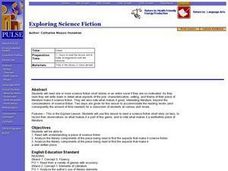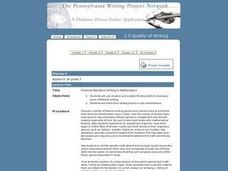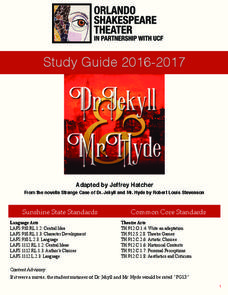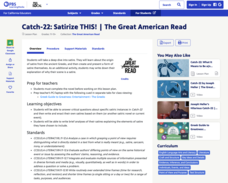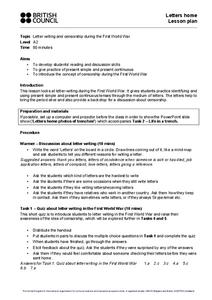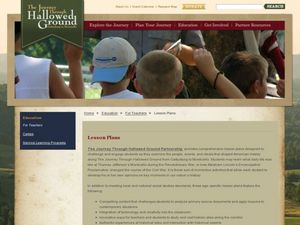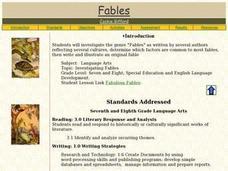Curated OER
Exploring Science Fiction
Twelfth graders read a variety of science fiction short stories. Using the text, they identify the components that make it science fiction and a well written piece of literature. They record their observations and share them with the...
Curated OER
Identifying Science Fiction
Students discuss works of science fiction that they read, highlight aspects that made each a part of science fiction genre, identify formal literary elements, and discuss ways each can be developed through science fiction.
Curated OER
Fictional Narrative Writing in Mathematics
Fifth graders discuss variety of fictional writing genres and connect each to familiar story that has been read, use creative and analytical skills to develop original piece of fictional writing that incorporates math skill, and share...
Curated OER
The Mythology of Munich
Students listen to a story read by their teacher and identify the pictures inside it to be real or make believe. In this fiction and non fiction lesson plan, students also write a real or make believe story of their own.
Curated OER
Catch-22
During or after reading Catch-22, have your high school scholars complete this research project. First they'll brainstorm a list of people they might like to research, then they'll dive into your library's resources! There are...
Curated OER
Hiroshima and Nagasaki: Still Teaching Lessons To This Generation
Discuss Laurence Yep's novella, Hiroshima, to inspire future historical fiction writers.
Curated OER
A Second Visit To Old Sturbridge Village-The Story Tour
Students conduct research on 1830s families and early New England culture. They conduct research on the Old Sturbridge Village website, participate in an online chat with a costumed interpreter, and continue to develop possible plots to...
Orlando Shakes
Dr. Jekyll and Mr. Hyde: Study Guide
Can science ever go too far? Learners explore this topic with the Dr. Jekyll & Mr. Hyde study guide. They read about the connection between scientific experimentation in fiction and real life and then compare a scene from the novella...
National Council of Teachers of English
Timelines and Texts: Motivating Students to Read Nonfiction
With the emphasis on incorporating more nonfiction in language arts classes the question arises about how to design activities that motivate kids to engage with informational text. How about an assignment that asks class members to...
Constitutional Rights Foundation
Ellis Island—The “Golden Door” to America
Are you one of the 100 million Americans whose ancestors passed through the doors of Ellis Island? Learn about the historic entry point for immigrants in the late 19th and early 20th centuries with an informative reading passage. After...
Smithsonian Institution
Art to Zoo: Life in the Promised Land: African-American Migrants in Northern Cities, 1916-1940
This is a fantastic resource designed for learners to envision what it was like for the three million African-Americans who migrated to urban industrial centers of the northern United States between 1910 and 1940. After reading a...
National Woman's History Museum
Pocahontas: The Truth vs. The Legend
Young historians study primary and secondary source materials to try and separate the true story of Pocahontas from the myths, fictional tales, and conflicting accounts of her life.
Curated OER
My Secret War - The WWII Diary of Madeline Beck: Lesson 2
Fifth graders explore world history by reading historical fiction. In this World War II lesson, 5th graders read the story My Secret War and identify the importance of fiction when analyzing history. Students answer study questions about...
Curated OER
The Civil War in Historical Fiction and Historical Accounts
Eighth graders examine life during the Civil War through various readings. They compare and contrast a novel they read in class to one they chose on the subject. They work together as a class to produce a newspaper displaying the...
Read Works
Cause and Effect Relationships in Historical Fiction
Centered around the book Pink and Say, by Patricia Polacco, the lesson presented here should help your class tackle cause and effect. The teacher reads the first few pages aloud and models in a think-aloud style how to identify...
PBS
Shifting Perspectives in Toni Morrison's Beloved
An interactive provides readers with an opportunity to record their reactions to Beloved, Toni Morrison's powerful narrative based on the life of Margaret Garner. Prompts ask them to consider how the shifting point of view contributes to...
PBS
Catch-22: Satirize This!
Some assignments are great, some can become great, and some have greatness thrust upon them. This one is great. After completing Joseph Heller's classic satire, Catch-22, groups craft and present their own political satire.
British Council
Letters Home
When you're writing historical fiction, the past really can become the present — especially if you're writing in the present continuous tense! Cover World War I, verb tenses, censorship, and letter writing with one informative lesson and...
Mary Pope Osborne, Classroom Adventures Program
Civil War on Sunday
Reading Mary Pope Osborne's Civil War on Sunday? Here's a packet crammed with activities, exercises, reading guides, and project suggestions. A must-have for your curriculum library.
Curated OER
Introducing the Essay: Twain, Douglass, and American Non-Fiction
Students analyze American essayists Mark Twain and Frederick Douglass in an introduction to American literary non-fiction writing. In this essay history lesson plan, students identify methods for writing essays. Students read and analyze...
Curated OER
Lesson Plan - The Barbara Frietchie Story – Fact or Fiction?
Students differentiate between fact and legend. In this Barbara Freitchie lesson, students read poetry and non-fiction accounts regarding the story of Freitchie. Students analyze the story of the American patriot to determine how much of...
Curated OER
Midnight Ride of Paul Revere: Fact, Fiction, and Artistic License
Students examine The Midnight Ride of Paul Revere. In this visual arts lesson, students study the historical significance of the event as they examine the Grant Wood painting and primary sources regarding the event.
Curated OER
Stranger Than Fiction
Students reflect on the importance of science literacy. They review the year's science curriculum by reading, discussing and writing questions on teacher-selected New York Times articles and the related science content.
Curated OER
Investigating Fables
Time for a story! Learners of all ages enjoy listening to stories, so read them some common fables and have them work cooperatively to create a fable. Differentiate for varying ability levels by providing sentence frames, graphic...


